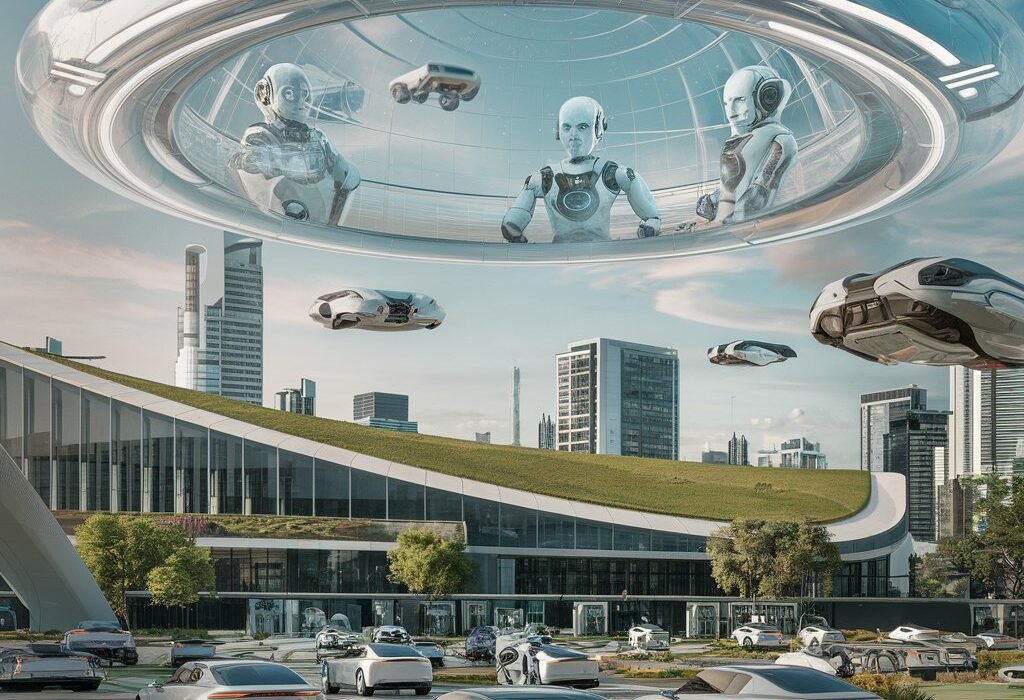Always devoid of fallacies, Artificial Intelligence is forever netting closer to deep, profound Sci-Fi dreams and visions. In a short span of time, it has progressed incredibly, finding its applications in our routines like they were impossible to imagine before. From self-driving cars to tailored suggestions on video on demand platforms, AI is changing businesses, economies, and entire civilizations.
However, where is the technology headed toward in the next ten years? In the following sections of this article, we will analyze the most significant trends, innovations, and most of all challenges that Artificial Intelligence is expected to address in the forthcoming years. Strap yourself in as we take you on a mission towards the future of Artificial Intelligence.
What is Artificial Intelligence?
Prior to looking ahead at future trends it is also important to explain what Artificial Intelligence (AI) is. In its basic sense, AI means machines or software that are made to accomplish work normally done by man. Such activities are learning, reasoning, problem-solving, comprehension of natural language and visual perception. It could be mentioned that artificial intelligence (AI) has a smaller section termed machine learning (ML) that allows the systems to learn from data and get better automatically without being explicitly coded.
As AI technology becomes more sophisticated, its applications continue to expand, influencing various sectors such as healthcare, finance, and entertainment. But what lies ahead for Artificial Intelligence in the next decade?
Artificial Intelligence and Automation
Artificial Intelligence will likely revolutionize the job market in the next ten years. One of the most significant changes will be automation. Industries like manufacturing, logistics, and customer service are already witnessing AI-driven automation that improves efficiency and reduces costs. But as AI becomes more advanced, it will take over more complex tasks.
Even if this seems great, there is hope. Different jobs that today we can barely picture will come into being thanks to artificial intelligence. The future will see great demand for AI specialists, data scientists, and robotic engineers. However, the important factor that will guarantee success in this era is the ability to learn new skills and work with AI instead of against it.
Artificial Intelligence in Healthcare
The next ten years will witness the rise of Artificial Intelligence’s application in the healthcare sector, which has the potential to be revolutionary. Owing to how advanced it is, AI algorithms can be of great assistance in analyzing medical data, aiding diagnostics and suggesting a treatment plan. In the next decade, the AI will be applied in a variety of areas such as predicting outbreaks of diseases, increasing the accuracy of surgeries and even helping in the discovery of new drugs.
For example, AI can analyze vast amounts of data from medical imaging and electronic health records to detect patterns that human doctors might miss. Machine learning models could identify early-stage diseases like cancer, diabetes, or Alzheimer’s with an accuracy that rivals or exceeds that of human specialists.
AI in Transportation: Autonomous Vehicles and Beyond
In the coming years, one of the most exhilarating possibilities of Artificial Intelligence is in transport. Vehicles driven and controlled by AI are already being tested on the roads today, and are expected to hit the market within the next decade. These vehicles use Artificial Intelligence in order to drive, think and communicate with the environment as required by the content.
With the introduction of autonomous vehicles, it is expected that the way people travel and wait for deliveries will change entirely. Self-sufficient AI-powered trucks could decrease significantly cost and time required for transportation of goods. Nevertheless, it leaves many concerns. For instance, how will the future of driving occupational risks look like, or what regulatory measures still have to be implemented?
AI Ethics: The Challenges We Face
Ethical concerns will only intensify as Artificial Intelligence gets even more advanced. Artificial Intelligence has the capacity to make autonomous decisions that directly impact the human race. There is no escaping the reality that privacy, bias, accountability, and transparency are all essential issues that need to be resolved as steward AI systems.
In the example, AI driven recruitment tools are harshly criticized for bias and therefore suboptimal results. If proper measures are taken, we can only hope that within the upcoming decade AI ethics will mature so much that rules can be outlined to regulate algorithms and stop discrimination in every step of the decision making process.
AI in Education: Personalized Learning at Scale
Artificial Intelligence holds great promise in reshaping education as we know it. Picture a scenario in the future where every single student receives lessons specifically crafted to suit their strengths, weaknesses, and pace of study. In the not so distant future, AI tutors will not only teach singular concepts and instructions, but also give constructive feedback which is tailored to each individual’s preferred manner of learning.
AI not only supports the instructors but also takes over administrative duties so that educators can pay more attention to the actual instruction. In future, as this technology continues to develop, AI could change classrooms to be more participatory, captivating, and productive.
AI and Creativity: A New Era of Art and Design
While many associate Artificial Intelligence with logic and problem-solving, AI also makes its mark in the creative industries. AI-driven tools will become increasingly sophisticated in generating art, music, literature, and even video content in the next decade.
AI can already create impressive artworks by analyzing vast datasets of existing work and generating new, unique pieces based on learned patterns. While some argue that AI cannot replace human creativity, its ability to assist and enhance the creative process will open new art and design frontiers.
The Role of AI in Sustainability
With global warming gaining center stage, it is evident that AI will have an ever increasing place in fighting sustainability factors. AI can improve energy usage, decrease waste and come up with diverse approaches for renewable energy sources.
AI has the ability to understand climate data in order to predict weather and even natural calamities which can assist societies in being prepared for extreme weather conditions in a better way. In addition, AI can assist in optimizing supply chain and the reduction of carbon emissions thereby making industries more
AI in the Next Decade: What to Expect
Overall, there are lots of opportunities for Artificial Intelligence in the next decade. Following are a few sectors which Artificial Intelligence is bound to alter drastically:
- Smarter AI Systems: As AI continues to evolve, we can expect more intuitive and adaptable systems. The rise of artificial general intelligence (AGI), which can perform any intellectual task that a human can do, will be a milestone to watch.
- AI and Quantum Computing: The convergence of AI and quantum computing will lead to breakthroughs in computational power, enabling faster processing of complex problems.
- AI-Powered Healthcare: The field of health care and patients outcomes will dramatically change as a result of progress in AI-based diagnostics, precision medicine, and robotic surgery.
- AI and Human Collaboration: Instead of pushing out people entirely, AI will further enhance human capacities and promote the human-machine relationship for better efficiency and innovation.
Conclusion
Artificial intelligence has a bright future ahead in the next decade. It has the potential to impact industries, improve healthcare, and alter the way humans work and exist altogether. However, while there are issues, especially with regard to ethics and employment displacement, the positives outweigh the negatives. Instead of fearing such developments, we should utilize these new advancements and work in tandem with AI for a better tomorrow.
FAQs
What is Artificial Intelligence, and how does it work?
Artificial Intelligence is a field of computer science that focuses on creating machines that can mimic human intelligence. It works through algorithms and machine learning models, enabling systems to learn from data and make decisions.
Will AI replace human jobs in the future?
While AI will automate many tasks, it is expected to create new jobs as well. The key will be for workers to adapt to new roles and skills that AI technology demands.
How will AI impact healthcare in the future?
AI will enhance medical diagnoses, personalize treatment plans, assist in surgeries, and predict health trends. It will greatly improve the efficiency and accuracy of healthcare delivery.
Can AI be creative?
Definitely. AI technology is already in use to create works of art, music and even literature. It may not be able to express human creativity in its entirety but it does enhance and make the creative process even easier.
What are the ethical concerns surrounding AI?
Through AI, learning experiences will be individualized, teachers will have more time to focus on students rather than paperwork, and the learning environment will be more immersive and interactive.
How will AI impact education?
AI will enable personalized learning experiences, assist teachers with administrative tasks, and create more engaging and interactive learning environments.

